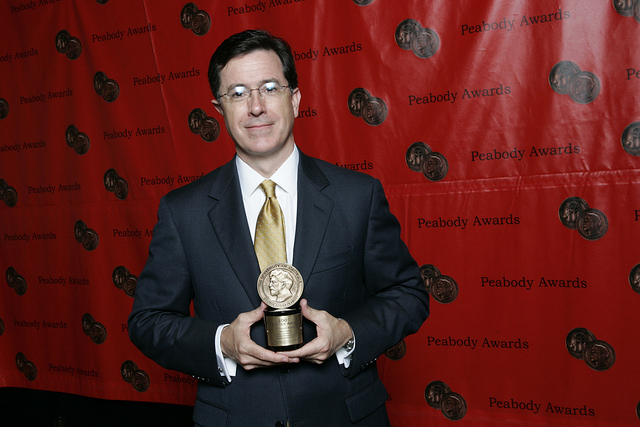Donald Trump, reality TV star and celebrity billionaire, is shown on television descending down an escalator inside one of his infamous hotels, announcing to an adoring crowd that he will run for the office of President of the United States.
When writer Dan Greaney wrote this scene into an episode of The Simpsons sixteen years ago, we all laughed.
“Trump was, of course, the most absurd placeholder joke name that we could think of at the time,” said show creator Matt Groening in October 2016, a month before the presidential election. “And that’s still true. It’s beyond satire.”[1]
“Beyond satire” is a fair characterization of the current state of the United States government as we plunge further and further into the Trump era of politics. Every new executive order or national security mishap is more outrageous than the last, and the frequency of scandals and disorderly conduct coming from this administration continues to increase.
Whether we want to admit it or not, our current political climate is in many ways more unbelievable and absurd than any TV writer could produce. But when reality follows a more ridiculous premise than the parody of that reality, does satire still serve a function?
Many would argue that the reality of Trump’s current administration is so ludicrous that it is no longer worth satirizing. South Park creators Trey Parker and Matt Stone told Australia’s ABC News that they struggled to keep up with the comedy presented by the divisive 2016 presidential election. In their upcoming season of the show, the creators have taken a different path altogether by expressing a desire to step back from political material, claiming the American government has become too difficult to mock.[2]
From the moment he announced his campaign for the presidency, we indulged ourselves in jokes about Donald Trump. But the jeers fell on deaf ears, and he won the White House. It’s fair to say nothing is funny about politics anymore. But to give up on satire because the jokes seem too difficult to land may be ill-considered.
Political satire has always had the potential to create content for a higher purpose than amusement. One of the best examples of this is when Stephen Colbert founded the Colbert Super PAC on his news satire show, The Colbert Report.[3] He took his audience through the relatively easy process of coordinating political action committees, organizations that raise money privately to influence elections. Surprisingly, Colbert succeeded where many traditional news sources have not in clearly explaining the inconsistencies in the laws governing PACs. For his work, Colbert even received a Peabody Award in 2011, an honor created to recognize excellence in the field of journalism and mass communication.[4]
A more recent example of political comedians using their medium to draw attention to important issues is Our Lady of Perpetual Exemption, a legally recognized church started by John Oliver in August of 2015 to draw attention to the tax privileges given to churches and charities with little government oversight.[5] Through this extensive joke, Oliver was able to give his audience a front row seat to how frighteningly easy it is to set up a tax-exempt religious establishment in the United States.
These are just a few cases that used political satire as a platform to bring absurd failures in our government to the forefront of the public’s mind in a memorable and entertaining manner. Neither comedian shied away from the subject matter because it was too grim to make fun of; they both used the preposterous nature of our reality to their advantage and presented material that highlighted the ridiculousness of our country’s situation in a way that was engaging and informative.
In the later years of the Obama administration, political satire outlets rose in popularity considerably. In fact, The Colbert Report and Jon Stewart’s The Daily Show were the two most-watched late night talk shows among 18- to 49-year-olds in the first quarter of 2013.[6] The Onion, a well-known satirical newspaper and website with a political comedy section, started with modest beginnings but now boasts 7.5 million readers monthly.[7]
More recently, the tremendously successful film Get Out, written and directed by comedian Jordan Peele, shows the potential for impactful political satire in the era of Trump. The film depicts an interracial couple visiting the young woman’s white parents for the first time since the beginning of their relationship. The movie, which Peele classifies as a “social thriller,” criticizes the attitudes and actions of affluent white liberals toward African-Americans through elements of horror and humor combined.[8] This form of satire that aggressively and successfully tackles issues like racial tensions shows promise for a future where political satire can be a leading voice on topics that are difficult for many journalists or ordinary citizens to facilitate.
Though comedy is no replacement for other institutions like watchdog journalism, satire is yet another vehicle in American democracy that can be used to provide important commentary on corrupt powers on a popularized platform. Most importantly, satire, just like any other creative medium, is at its best when it reflects a thoughtful and persuasive stance on an issue and at its worst when it creates content that patronizes the very power structures it is meant to parody.
To find an example of a program that has produced both extremely effective as well as extremely disappointing material, look no further than political commentary produced on Saturday Night Live.
In June of 2015, SNL’s host network NBC formally denounced and broke business ties with Trump due to his comments on the campaign trail about immigrants.[9] The network removed Trump from his eight-year-long arc as host of the TV show “Celebrity Apprentice” and pulled out of its standing commitment to broadcast the Miss Universe pageant in late June 2015, which at the time was co-owned by the Trump Organization.[10]
In November 2015, less than six months later, SNL came under harsh criticism for booking Donald Trump as a host during his campaign, marking him as the first political candidate to ever host an entire episode and not just appear in a cameo role. Trump’s appearance was a commercial success for the program with a staggering 9.4 million viewers, becoming the most watched episode of SNL since 2012.[11] However, the jokes performed catered to Donald Trump and worked to his advantage, allowing him to make more snide comments about Rosie O’Donnell and make light of his insensitive racial rhetoric by mocking the organization Deport Racism, who offered $5,000 to anyone that called Donald Trump a racist during the episode.[12] Despite NBC’s surface shunning of Donald Trump, it still allowed its program to use the candidate’s popularity to increase the network’s ratings. In that moment, SNL and NBC showed that it is inherently ineffective and hypocritical to create content parodying a corrupt political figure while exploiting their image to cultivate higher viewership.
Despite these missteps, as a program with over 40 years worth of content, there are many bright spots in SNL’s history. SNL famously spoofs government officials during election season, wielding its influence by creating characters and performances that define the general public’s perception of the candidate better than the candidates themselves.
In 2000, SNL’s caricature of Al Gore as a nerd obsessed with his “lockbox” plan was so devastating that his aides reportedly encouraged him to watch the sketches and correct his performance in debates accordingly.[13] Ironically, prior to the SNL sketches, tracking polls suggested the public viewed Gore as the debate winner. But once the spoofs caught on and sunk in, outlets like the New York Times began calling him “an overbearing know-it-all.”[14] Though the sketches written to parodize Al Gore were simply comical at face value, satire had a tangible influence on the reality of politics, for better or for worse.
Fast forward to 2017 and SNL has produced an extensive amount of material mocking high-ranking members of the Trump administration, such as Alec Baldwin as President Trump, Melissa McCarthy as Press Secretary Sean Spicer, and Kate McKinnon as Counselor to the President Kellyanne Conway. Whereas past administrations have kept their feelings on the sketches to themselves, President Trump has made it clear that he is insulted and bothered by the portrayal of him, calling Baldwin’s impression of him “really mean-spirited” and “not very good” on The Today Show.[15]
Many critics claim that this type of visceral reaction from the President has helped reignite the show’s reputation for creating ambitious satire.
“What makes ‘SNL’s’ Trump material so brilliant is that, perhaps for the first time, the cast and crew are more than aware that Trump is watching,” wrote Salon’s Bob Cesca. “Rather than being deferential, ‘SNL’ is deliberately crawling up Trump’s a–, and they know it’s working, thanks to Twitter.”[16]
It is an exciting time for comedy when the President of the United States is believed to be watching every jab taken at him, fuming as his character is portrayed to a laughing audience as an incompetent Russian puppet. As his presidency continues over the next four years, it is not unfathomable to think that smart and aggressive political satire will force President Trump to reevaluate how his image is perceived by the rest of the world, just like Al Gore and countless others were forced to consider.
Political comedy moving forward should be less concerned with pandering to the Trump administration in order to get views and should instead dedicate itself to pointing out the issues Trump has brought to the presidency so far. If political satire is to remain relevant during a Donald Trump presidency, it needs to move forward by embracing its underlying use as a way to bring the corrupt and absurd to the attention of the public, not just to garner a cheap laugh.
[1] Andrew Marlton. “The Simpsons’ Matt Groening: ‘President Trump? It’s beyond satire.” The Guardian. October 13th, 2016.
[2] ABC News. “Trey Parker and Matt Stone say US politics is currently “much funnier than anything we could come up with.” ABC News. February 2nd, 2017.
[3] Americans for a Better Tomorrow, Tomorrow. “Colbert Super Pac.” The Colbert Report.
[4] Peabody Awards. “The Colbert Report, Super PAC Segments (Comedy Central).” Grady College of Journalism and Mass Communication. February 9th, 2015.
[5] Ryan Reed. “Watch John Oliver Blast Televangelists, Create His Own Mega-Church.” Rolling Stone. August 2017, 2015
[6] Anthony Thai. “Political Satire. Beyond the Humor.” The Harvard Crimson. February 6th, 2014
[7] Bradley Whitaker. “The Impact of Political Satire.” Tenley Times. April 21st, 2013.
[8] Michael Phillips. “Jordan Peele’s ‘social thriller’ launches a directorial career.” The Chicago Tribune. February 24th, 2017.
[9] NBC News. “NBC Cuts Business Ties with Donald Trump Over Immigration Remarks.” NBC News. June 30th, 2015.
[10] Nolan Feeney. “NBC Cuts Ties With Donald Trump Over Immigration Remarks.” Time. June 29th, 2015.
[11] Ali Vitali. “Donald Trump Hosts ‘Saturday Night Live’ Amid Protests.” NBC News. November 8th, 2015.
[12] Megan Garber. “Live From New York, It’s Donald Trump.” The Atlantic. November 8th, 2015.
[13] Adam Howard. “How ‘Saturday Night Live’ Has Shaped American Politics.” NBC News. September 30th, 2016.
[14] Richard L. Berke. “The 2000 Campaign: The Debates; In Debate 2, Microscope Focuses on Gore.” The New York Times. October 11th, 2000.
[15] The Today Show. Twitter Post. December 7th, 2016, 4:47 AM.
[16] Bob Cesca. “Thanks, Trump! “Saturday Night Live” reclaims its satirical mojo amid a national emergency.” Salon. February 6th, 2017.



